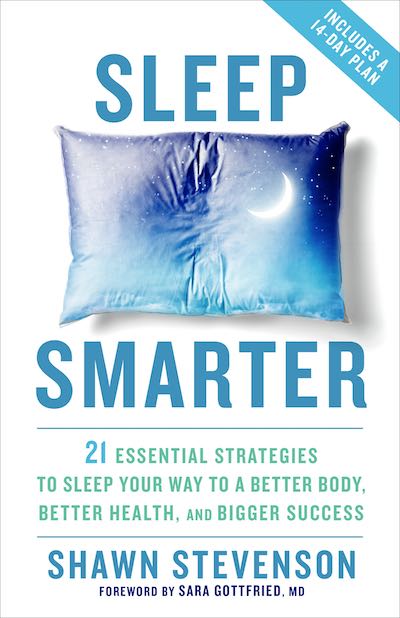Is Your Gut Health Sabotaging Your Sleep?
So it's too bad that falling asleep (and staying asleep!) is so tough for so many people—as in, the 50–70 million American adults with a sleep or wakefulness disorder, according to the Centers for Disease Control and Prevention. These days, pillow problems are a full-blown epidemic. (Right, Arianna Huffington?)

Which is why Shawn Stevenson—writer, nutritionist, and creator of the super popular "Model Health Show" podcast—focused specifically on ZZZs in his new book, Sleep Smarter. And one of his top strategies is…wait for it: improving your gut health.
“There’s a remarkable connection between gut health and sleep, and a lot of people have no idea about it,” says Stevenson, who admits his own ignorance on the subject until he really dove into the research.
Melatonin—the regulator of the body’s sleep-wake cycle—is produced in the brain, but there’s also a ton of it in your digestive tract. “The health of the bacteria in your gut, what we call your microbiome, is critical to the production and proper function of your sleep-related hormones,” he explains.
Bettering your gut health in order to boost sleep is a process that takes some time (you are, after all, talking about supporting bacteria, which then have to support cells, which then go on to produce the hormones that are one of the many things that affect sleep), but it's worth it, he says.

{{post.sponsorText}}
Here are Stevenson's tips to boosting your gut health in the name of improved ZZZs.
First, do no harm.
The number-one thing to do when it comes to maximizing the sleep-gut health connection, according to Stevenson, is to avoid the things that are going to damage your microbiome. That means agricultural chemicals (which destroy bacteria) and processed foods (also gut microbe destroyers). Another culprit? Heavy antibiotic use, Stevenson says, as well as excessive chlorine exposure and chemical additives in food.
Then, stock up on the good stuff.
“You have to eat more good sleep nutrients,” Stevenson urges. Magnesium is probably the first place he looks. It helps regulate more than 300 biochemical processes in the body, and studies have shown that getting enough of it can improve sleep problems, he says.
You can get magnesium from food sources, like dark leafy greens, nuts, and seeds, but supplementation can help. Stevenson likes topical options that are absorbed through the skin because oral supplementation puts you at risk of, well, diarrhea. As for other important sleep-promoting nutrients? Calcium, potassium, and selenium, he says. (Try one of these eight snooze-inducing foods to start.)
Get plenty of probiotics and prebiotics.
Probiotic foods—which are rich in healthy, live bacteria—are crucial to good gut health, and Stevenson's a big fan of options like miso, yogurt, and kimchi, to name a few. But prebiotic-rich foods, which nourish the healthy bacteria that are already in your gut, are equally important, he says. Try Jerusalem artichokes and raw garlic.
Then don’t neglect the other stuff.
You can work hard to get your gut in good shape, but if you’re still falling asleep with blue light-emitting electronic sources in your bedroom, you’re simply not going to get good quality ZZZs. Stevenson recommends that people turn off their devices at least an hour before bedtime, and use that time to talk, read, or (yup!) have sex. Or at the very least, try an app that helps cut the blue light that emits from your phone and invest in good blackout curtains. Then let your gut do its thing.
Newsflash: Not all guts are the same! Here's how to figure out what type you have. Plus, check out this popular nightly ritual that could be affecting your gut balance and sapping your energy.
Loading More Posts...